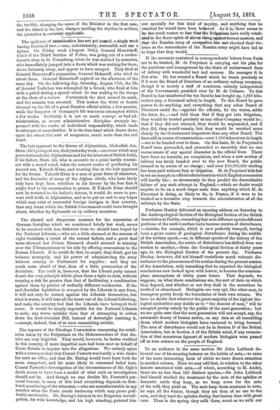If the accounts contained in correspondents' letters from Paris are
to be trusted, M. de Freycinet is carrying out his plan for the purchase and management by the State of embarrassed lines of railway with wonderful tact and success. He manages it in this wise. He has created a Board which he treats precisely as if it were the Board of Directors of an ordinary railway company, though it is merely a staff of nominees, entirely independent of the Government, presided over by M. de Calmon. To this Board he has transferred the ten lines he has bought up, 1,600 kilo- metres (say, a thousand miles) in length. To this Board he gave power to do anything and everything that any other Board of Directors could do,—appoint the officials, fix the trains, settle the fares, &c.,—and told them that if they get into litigation, they would be treated precisely as any other Company would be ; that if they did not succeed, they would be superseded, and if they did, they would remain, but they would be watched more closely by the Government Inspectors than any other Board. The lines still in course of construction—over 1,000 kilometres in length —are to be banded over to them. On this basis, M. de Freycinet's Board have proceeded, and proceeded so smoothly that no one seems aware of any special character in the official lines. There have been no lawsuits, no complaints, and when a new section of railway was lately handed over to the new Board, the public seemed to be aware of no change ; and over 210,000,000 sterling has been paid without furls or litigation. M. de Freycinet bids fair to set an example in official administration which Englisheconomists will hardly like ; so strenuously do they predict the discreditable failure of any such attempt in England,—which no doubt would require to be on a much larger scale than anything which M. de Freycinet is doing, or likely to do, in France, if it were to be treated as a tentative step towards the administration of all the railways by the State.






























 Previous page
Previous page